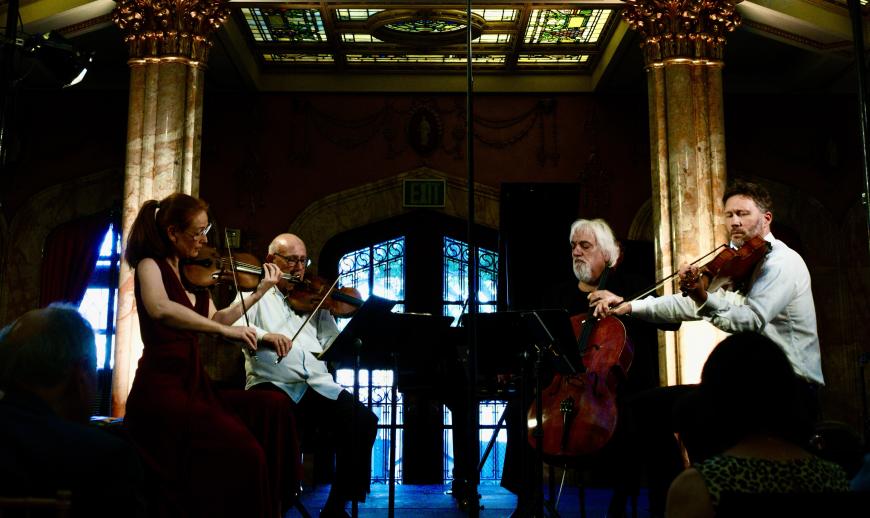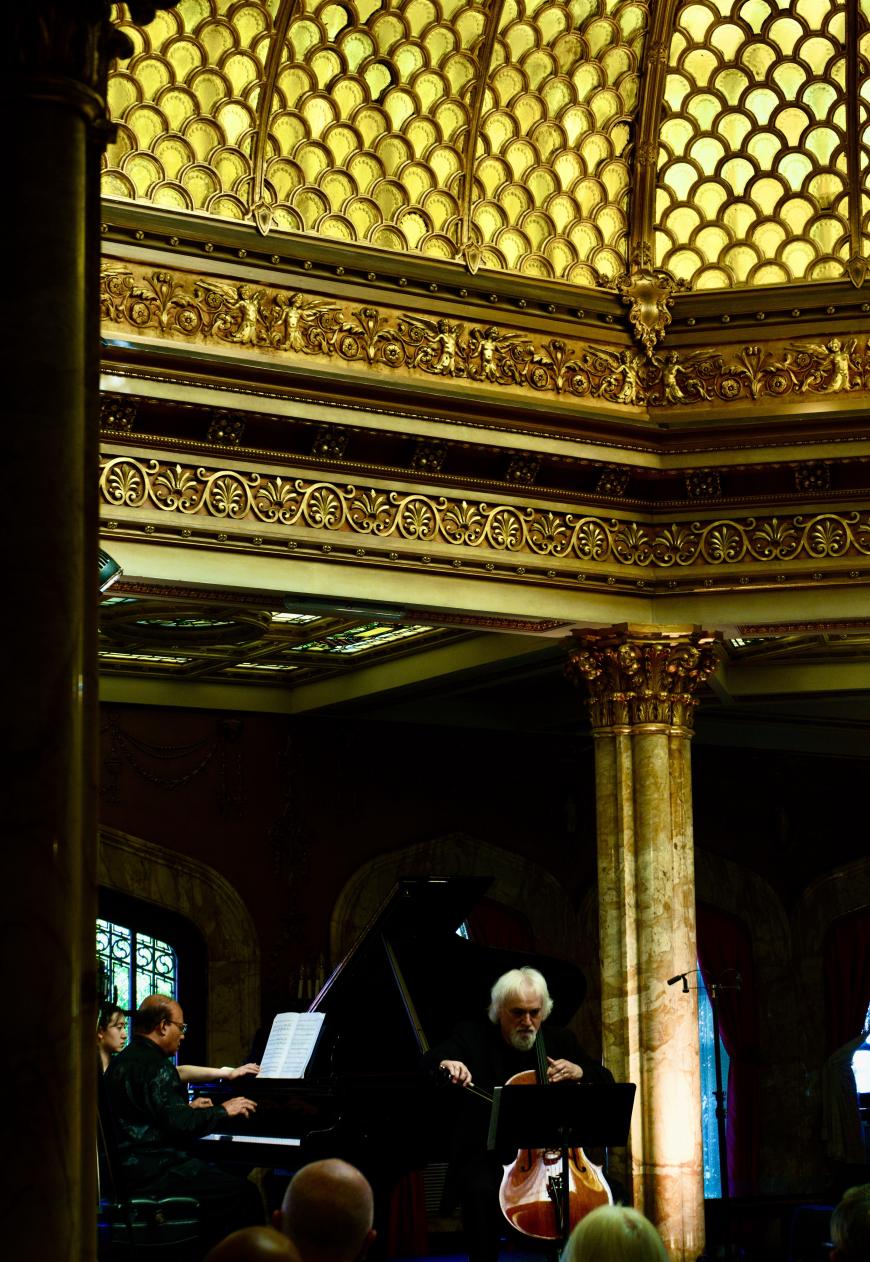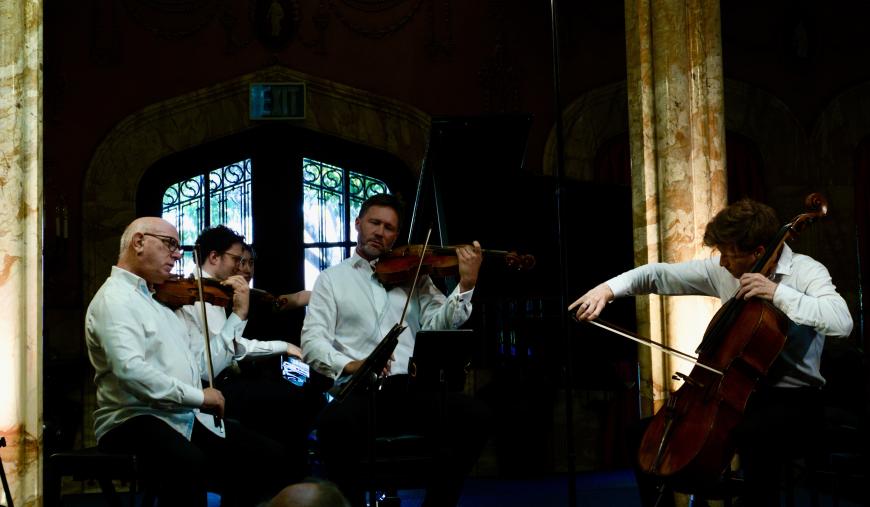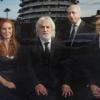
Bohuslav Martinů was 9 years old and living in Bohemia when the future mansion home of Los Angeles oil baron Edward L. Doheny was completed. Bedřich Smetana, considered the father of Czech nationalist music, had died 15 years earlier, and Antonín Dvořák, following a productive (if unhappy) tenure composing and conducting in the United States, had returned home to his beloved Prague.
Saturday, beneath the Tiffany domed ceiling of the Doheny Mansion’s Pompeian Room, the members of the New Hollywood String Quartet (NHSQ) performed the third of four concerts devoted to the rich musical repertory that defined the Czech nationalist movement. The Quartet’s core members — violinists Tereza Stanislav and Rafael Rishik, violist Robert Brophy, and cellist Andrew Shulman — were joined by pianists Rohan De Silva and Rodolfo Leone and cellist Eric Byers.

This Summer of Bohemia celebration represents the latest in a series of chamber music festivals to be presented by the NHSQ in collaboration with The Da Camera Society of Mount Saint Mary’s University, whose Chester Place campus includes the Doheny Mansion.
The mini festivals began in 2019 with the Summer of Brahms, which featured performances of all 25 of the composer’s instrumental chamber works, presented in eight consecutive concerts. In 2021, Vienna Holiday celebrated chamber music by Franz Schubert and Mozart. 2022 was the Summer of Beethoven, with 2023 dubbed the Summer of Paris and devoted to the music of Claude Debussy and Maurice Ravel.
In an insightful programming move, Martinů’s Cello Sonata No.1 in B-flat Minor, Dvořák’s Piano Quartet No. 2 in E-flat Major, and Smetana’s String Quartet No. 1 in E Minor (“From My Life”) were performed in reverse historical order, like the backward glance of Stephen Sondheim’s Merrily We Roll Along.
In 1939, Martinů was living in Paris, about to flee to America one step ahead of the Nazis. His music from this period is clearly influenced by the vocabularies of 1930s modernism. In 1889, Dvořák was at the height of his powers, expanding the Romanticism of Brahms to include a Bohemian accent of enthusiastic, seemingly endless inventiveness.
The backward journey reached ground zero in 1876 with Smetana, who was dying slowly from syphilis, taking the string quartet form in the direction of a personal narrative tone poem combining emotional depth with the dreamlike, sophisticated glitter of 19th-century Bohemian elegance.
In his introductory comments Saturday, musicologist and Da Camera Society Artistic Director Julius Carlson made a point of Bohemia’s geographical position as an outlier to the cultural mecca of Vienna. Also, he emphasized how the embrace of Bohemian folk traditions and dances played a significant role in the establishment of a nationalistic musical movement unbound to Vienna.
What was not discussed was the later influence exerted by what had transpired in Paris between the two world wars, including the impact of Igor Stravinsky, Sergei Prokofiev, and the loosely affiliated composers of Les Six. The performance of the Martinů sonata by De Silva and Shulman clearly captured the momentum of the era with its percussive attacks, back-and-forth rhythms, and dense tone clusters — all overshadowed by the ominous approach of war.

Reflecting a very different historical era, the performance of Dvořák’s Second Piano Quartet, featuring Leone, Rishik, Brophy, and Byers, shimmered and glowed as the work’s four movements shifted between crystalline sophistication, glowing ebullient energy, and ensemble expressions that filled the room with their symphonic dimension.
The concluding performance of Smetana’s quartet, performed by the NHSQ, captured perfectly the composer’s sense of regret intermingled with lamenting whisps of memories from more joyful times — loves won and lost and dances danced.
It’s hard to imagine a more perfect setting for this concert than the Pompeian Room — an acoustically bright space in the grand tradition of the Gilded Age. It’s easy to forget, in the era of large concert halls, what it’s like to be able to savor every tone, overtone, and softly fading diminuendo.
The Da Camera Society deserves ample praise for 50 years of musical presentations. One might only wish that during the long Los Angeles summer, when the musical landscape is all but devoured by the Hollywood Bowl concerts, the Doheny Mansion could open its doors to a succession of similar intimate chamber music events.




